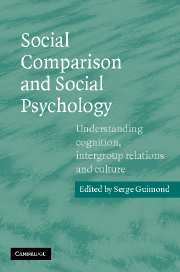Book contents
- Frontmatter
- Contents
- List of figures
- List of tables
- List of contributors
- Preface
- Introduction: social comparison processes and levels of analysis
- Part 1 Cognition: comparison processes within and between individuals
- Part 2 Intergroup relations: comparison processes within and between groups
- Part 3 Culture: comparison processes within and across cultures
- Author index
- Subject index
- References
Introduction: social comparison processes and levels of analysis
Published online by Cambridge University Press: 27 October 2009
- Frontmatter
- Contents
- List of figures
- List of tables
- List of contributors
- Preface
- Introduction: social comparison processes and levels of analysis
- Part 1 Cognition: comparison processes within and between individuals
- Part 2 Intergroup relations: comparison processes within and between groups
- Part 3 Culture: comparison processes within and across cultures
- Author index
- Subject index
- References
Summary
“I do not know how far I differ from other people. That is another memoir writer's difficulty. Yet to describe oneself truly one must have some standard of comparison; was I clever, stupid, good looking, ugly, passionate, cold –? Owing partly to the fact that I was never at school, never competed in any way with children of my own age, I have never been able to compare my gifts and defects with other people's”
(Virginia Woolf, A sketch of the past, autobiographical writings of 1939)Fifty years ago, Festinger (1954) published a Theory of social comparison processes. Today, thirty-five social and cognitive psychologists who share a common interest in comparison processes combined their efforts to make this new book on the same topic a reality. Few theories in social psychology have stood the test of time as successfully as the theory of social comparison. Even today, major theoretical and empirical papers on social comparison processes are being published in the best scientific journals (for example, Buunk and Ybema, 2003; Markman and McMullen, 2003; Mugny, Butera, Quiamzade, Dragulescu and Tomei, 2003; Mussweiler, 2003; Spears, Gordijn, Dijksterhuis and Stapel, 2004; Stapel and Suls, 2004 and many others). How can one explain the tremendous amount of research that continues to investigate the psychological role of social comparison? What makes social comparison so important? These questions will be answered in the following chapters.
However, this book is not “only” about social comparison. It is also about social psychology.
- Type
- Chapter
- Information
- Social Comparison and Social PsychologyUnderstanding Cognition, Intergroup Relations, and Culture, pp. 1 - 12Publisher: Cambridge University PressPrint publication year: 2005
References
- 1
- Cited by



